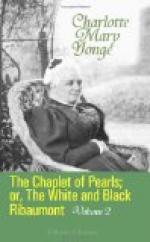Lord Walwyn was, as we have seen, one of those whose Church principles had altered very little and very gradually; and in the utter diversity of practice that prevailed in the early years of Queen Elizabeth, his chaplain as well as the rector of the parish had altered no more than was absolutely enjoined of the old ceremonial. If the poor Baron de Ribaumont had ever been well enough to go to church on a Sunday, he would perhaps have thought himself still in the realms of what he considered as darkness; but as he had never openly broken with the Gallic Church, Berenger had gone at once from mass at Leurre to the Combe Walwyn service. Therefore when he spent a Sunday at Rouen, and attended a Calvinist service in the building that the Huguenots were permitted outside the town, he was much disappointed in it; he thought its very fervour familiar and irreverent, and felt himself much more at home in the cathedral into which he strayed in the afternoon. And, on the Sunday he was at Leurre, he went, as a part of his old home-habits, to mass at the old round-arched church, where he and Eustacie had played each other so many teasing tricks at his mother’s feet, and had received so many admonitory nips and strokes of her fan. All he saw there was not congenial to him, but he liked it vastly better than the Huguenot meeting, and was not prepared to understand or enter into Mr. Adderley’s vexation, when the tutor assured him that the reverent gestures that came naturally to him were regarded by the Protestants as idolatry, and that he would be viewed as a recreants from his faith. All Mr. Adderley hoped was that no one would hear of it: and in this he felt himself disappointed, when, in the midst of his lecture, there walked into the room a little, withered, brown, dark-eyed man, in a gorgeous dress of green and gold, who doffing a hat with an umbrageous plume, precipitated himself, as far as he could reach, towards Berenger’s neck, calling him fair cousin and dear baron. The lad stood taken by surprise for a moment, thinking that Tithonus must have looked just like this, and skipped like this, just as he became a grasshopper; then he recollected that this must be the Chevalier de Ribaumont, and tried to make up for his want of cordiality. The old man had, it appeared, come out of Picardy, where he lived on soupe maigre in a corner of the ancestral castle, while his son and daughter were at court, the one in Monsieur’s suite, the other in that of the Queen-mother. He had come purely to meet his dear young cousin, and render him all the assistance is his power, conduct him to Paris, and give him introductions.
Berenger, who had begun to find six Englishmen a troublesome charge in France, was rather relieved at not being the only French scholar of the party, and the Chevalier also hinted to him that he spoke with a dreadful Norman accent that would never be tolerated at court, even if it were understood by the way. Moreover, the Chevalier studied him all over, and talked of Paris tailors and posture-masters, and, though the pink of politeness, made it evident that there was immensely too much of him. ’It might be the custom in England to be so tall; here no one was of anything like such a height, but the Duke of Guise. He, in his position, with his air, could carry it off, but we must adapt ourselves as best we can.’




